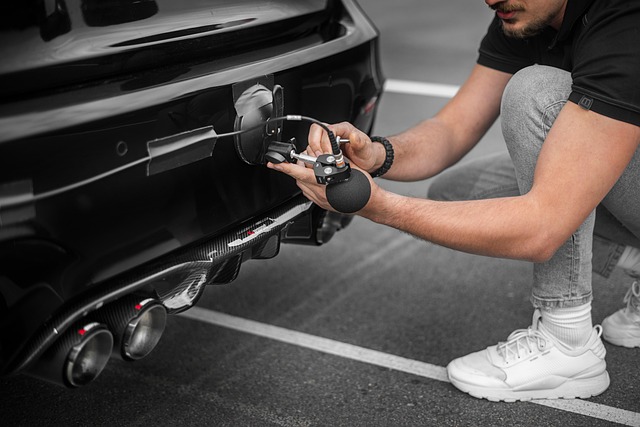Car alarms have evolved from simple noise makers to advanced security systems, offering GPS tracking, remote control, and encryption for protection against theft and vandalism. When selecting car alarms, consider your security needs, vehicle compatibility, and preference for silent or visible alerts. Remote control options range from key fob remotes to smartphone apps, providing peace of mind and driver alerts. Professional installation and regular maintenance ensure optimal reliability and compliance with local laws regarding alarm volume and lighting.
Car alarms have evolved from simple deterrents to sophisticated security systems, offering peace of mind and advanced protection. This comprehensive guide explores the essentials of car alarms, highlighting their benefits and how they safeguard your vehicle. We’ll navigate factors to consider when selecting Car Alarms, delve into different remote control types, and cover installation, maintenance, and legal aspects. By understanding these elements, you can make an informed decision and choose the best system for your needs.
- Understanding Car Alarms: Basics and Benefits
- Factors to Consider When Selecting a Car Alarm System
- Types of Remote Controls for Car Alarms
- Installation, Maintenance, and Legal Aspects of Car Alarms
Understanding Car Alarms: Basics and Benefits

Car alarms have evolved from simple noise makers to sophisticated security systems that protect your vehicle and its contents. At their core, they serve as silent car theft deterrents by alerting potential intruders and drawing attention to unauthorized attempts at entry. Modern car alarm systems incorporate cutting-edge technology, such as GPS tracking, remote control capabilities, and advanced encryption, providing owners with peace of mind while enhancing the overall security of their vehicles.
Understanding the basics of car alarms is crucial when selecting an affordable car security solution that aligns with your needs. The latest in car security technology offers a range of benefits, from preventing theft to safeguarding against vandalism. By investing in a well-designed alarm system, you not only protect your investment but also ensure the safety and integrity of your personal belongings while on the road or parked.
Factors to Consider When Selecting a Car Alarm System

When selecting a car alarm system, several key factors come into play. Firstly, consider the level of security required; basic models offer loud sirens for deterrence, while advanced systems incorporate GPS tracking and smart phone apps for real-time monitoring. Additionally, think about the vehicle’s make and model, as some cars may have built-in compatibility with certain alarm brands, simplifying installation.
Another important aspect is the type of alarm you prefer. There are hush silent car alarms that discreetly protect your vehicle without drawing attention, ideal for stealthy operations. Alternatively, visible car alarm deterrents come with bright LED lights and loud sirens to scare off potential thieves. For a more professional approach, consider hiring specialists for a custom-fitted car alarm, ensuring optimal performance and integration with your vehicle’s electrical system.
Types of Remote Controls for Car Alarms

When it comes to selecting a car alarm with remote control, the options are vast, each catering to different needs and preferences. One popular choice is the traditional key fob remote, offering a simple yet effective way to arm and disarm your system. These remotes typically feature a range of buttons for various functions, such as locking/unlocking doors and setting different alarm modes.
For those seeking more advanced driver-side alerts, smart phone apps can be integrated into car alarm systems. This technology allows users to control and monitor their alarms remotely via their mobile devices. With these app-based remotes, you can not only arm and disarm your system but also receive instant notifications of potential security breaches, giving you peace of mind while enhancing your auto theft deterrents. Hush silent car alarms are another innovative option, designed for discreet operation without drawing unwanted attention.
Installation, Maintenance, and Legal Aspects of Car Alarms

When installing a car alarm with remote control, it’s essential to ensure proper placement for optimal effectiveness. This involves selecting strategic points within the vehicle, such as the engine compartment, doors, and trunk, to maximize protection against theft. A professional installation is recommended to guarantee secure wiring and avoid potential short circuits or false triggers. Regular maintenance is equally vital; checking batteries, sensors, and connection points periodically ensures the alarm remains operational and reliable.
Legal considerations are also crucial when it comes to car alarms. Different regions have varying regulations regarding alarm volume, lighting, and operation. It’s important to select a car alarm that complies with local laws, such as those promoting quiet or low-light alerts to avoid disturbing neighbors. Staying informed about these legal aspects and choosing the right auto access control system, like the latest in car security technology, will ensure your investment not only protects your vehicle but also adheres to community standards.
When selecting a car alarm system with remote control, understanding your vehicle’s needs and personal preferences is key. By considering factors like sensor types, remote range, and compatibility, you can choose a car alarm that enhances security without causing undue hassle. Remember to navigate legal requirements and ensure proper installation and maintenance for optimal peace of mind while driving.
